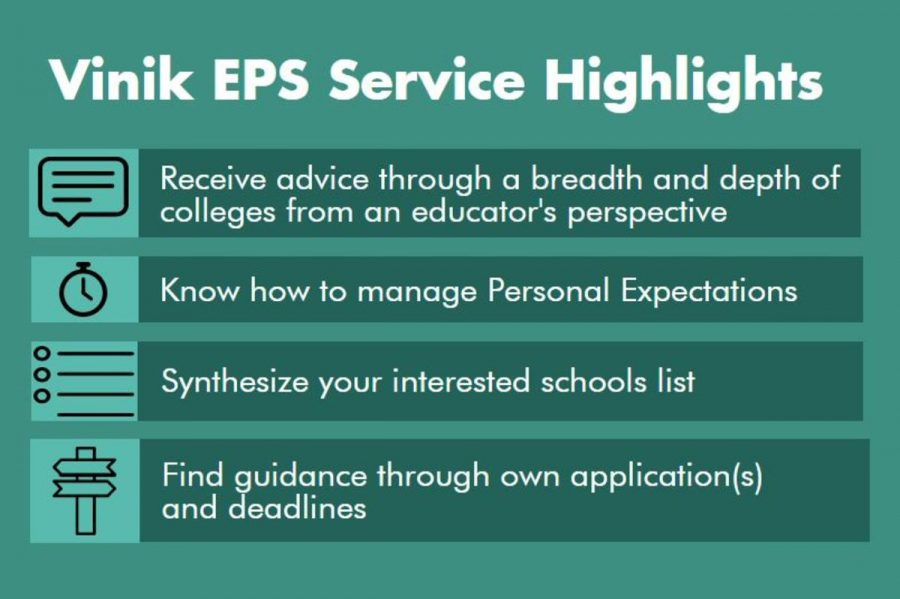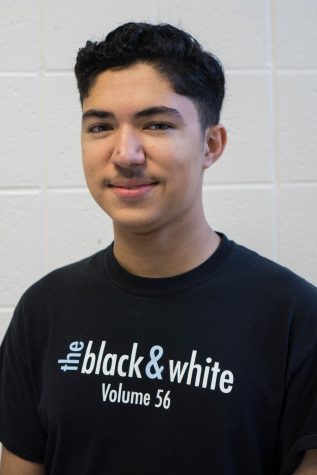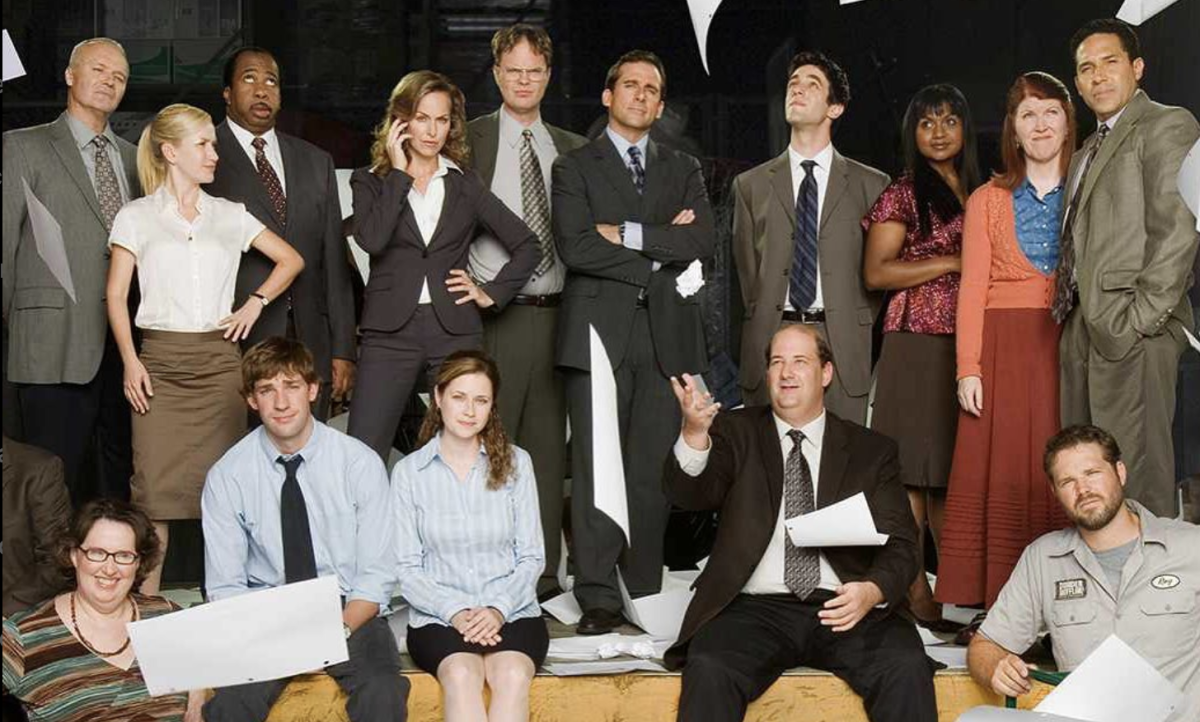Q&A: college counselor Bruce Vinik
Graphic by Meimei Greenstein.
May 9, 2018
Former educator Bruce Vinik is the founder and president of Vinik Educational Placement Services, a higher-education placement consulting firm. Since 2001, Vinik has provided clients in the Montgomery County and D.C. area with college-consulting services as well as graduate and law school admissions consulting. He now helps local high school students and families navigate the college process alongside counselors Laura Hosid and the most recent addition to his team, his daughter Annie Vinik. The following interview has been edited for length and clarity.
Black & White: Why did you start working as a college counselor?
Bruce Vinik: I was thinking about leaving the world of working in schools and was trying to decide exactly what I wanted to do. I knew I wanted it to be with kids and I knew I wanted it to be in education. I thought about all the different things that I’d done over the years and a lot of my career was at Georgetown Day school in D.C., and what I really enjoyed the most was being the director of college counseling for a few years and I really loved it. I knew I enjoyed that work but I also knew because I had been an alumni interviewer for Duke University; I had been interviewing kids for years. Through my conversations with them I got the sense that they weren’t getting quite as much guidance as would be ideal. I mean, there are a lot of counselors in schools including Whitman who are terrific and some students who get everything they want that way, but there are also a lot of students out there from public and independent schools who don’t and feel like they need a little bit more help. Because I had that sense through my interviewing for Duke I thought, ‘this is a business that could work,’ and so that’s how I started.
B&W: What are the most important abilities needed to advise students during the college admissions process, how do you keep on top of that and how has your prior experience inform what you do as well?
BV: First of all, any consultant needs to know what the college landscape looks like, has to have spent time researching schools, reading about schools, but more importantly has to have spent time visiting schools. So when you talk to consultants including Annie, Laura and me, you’ll find that people over the course of their careers have visited hundreds of campuses—we try to focus on those schools that our clients are most likely to be interested in. We continue to read about schools, we do our research, we talk to students—our clients—who have been to these schools or go to school at these places to try to stay up on that. I also think that as a consultant, you really need to know how schools work. I think it’s very important to have some understanding about the way high schools work; I also think it’s very important to understand about the world of college admissions. To me, having experience whether it’s coming out of a high school and working there as a teacher or administrator, or working at the college level—I think those are very important in making consultants much better at what they do. I say this all the time to people: I can’t imagine giving good advice to kids and to parents without the experiences that I had working in schools. I have a much better sense of how things work and the issues that kids and families are thinking about because of all the time that I spent as a teacher and administrator.
B&W: What is the primary reason why students and families chose to hire a college consultant?
BV: I think it varies. When I look back at the hundreds, probably thousands of families that I’ve worked with, I think there are two things that stand out. One is that people often feel that the feedback we can give them about appropriate college choices is really useful; given what we know about all the different schools in the country, and what it takes to get in, the strength of the schools, etc. I think that families really value the input that we’re able to provide. The other thing that I think families value and why they come to us or any consultant, for that matter, is help during the application process. So, consultants are able to give feedback about essays, make sure that kids are staying on top of their applications and deadlines and I think that probably along with the whole college identification part, I think those are the two things that really stand out.
B&W: Is there one piece of advice you would give students and families who may be struggling in the process and are deciding whether or not they would like to consult (potential clients)? What is the best way for people to figure out how much help they want?
BV: First of all, I recognize that if you look at Whitman or any of the schools in Montgomery county or Northern Virginia, you know most kids and families go through this process without any help, and so I think if you’ve got kids who are reasonably knowledgeable about the college admissions process and parents who have some idea about what’s going on, they can do the research and learn what they need to do. That’s why I think most people who go through the process don’t have help. On the other hand, I do think that consultants, because we spend so much time working in this broad area, we have a little bit better sense of the colleges that are out there that might be good matches for kids. Parents and students have to assess their comfort level in the whole process: Do they feel that they have the time to manage everything? Do they feel they know enough about colleges and all the different options that are out there? Do parents feel their kids are going to need help managing the process with more input from a third party adult? If they’re wondering about if it’s something they should do, I think it makes sense to email or call one of the many consultants in this area and find out what consultants have to offer. Many of us will have free introductory meetings to help families make the decision about whether or not they need some college counseling.
B&W: Is there any major way in which the work itself has changed in the last few years?
BV: The biggest change in the work I think over the years I’ve been doing it is that families want to start the process earlier than they used to. In the last 10 or 11 years, I think as there’s been more publicity about the competitive nature of college admissions families, and parents especially have really come to feel that starting the process a little bit earlier benefits them and benefits their kids. And so because I kept getting requests to start meeting earlier I changed our timetable. So where we originally began to meet with junior in the winter, we’re now meeting with them in the middle of the fall and so there’s roughly a three or four month difference. I think if everybody involved keeps things in perspective—and that means consultants, kids, parents—starting in the fall of junior year works.
B&W: What’s your favorite part of what you do and what’s a most challenging aspect of your work?
BV: My favorite thing, and this has always been true, I just love helping students figure out colleges that are really good matches for them. When I first sit down with kids and go over their grades and test scores and find out more about them—what they’ really interested in the kind of classes they like, where they want to be—just helping them put together a list that really makes sense for them and where to apply. That to me is interesting and fascinating and it’s fun, it’s just something that I really enjoy. The most challenging piece—since these are very competitive places—is helping people, both kids and parents just kind of get used to the idea that you don’t get a hundred percent typically. So it’s helping families manage expectations that can be challenging, but it’s also an interesting part of the process for everybody. The reality is, if you work hard in school, get the best grades you can, do as well as you can on testing, you do what you can on essays, you have a few activities, you know and you take decent courses, the odds are you’re going to get into a bunch of really good schools, places that you’re going to like a lot. Does it mean that you’re going to get into Yale? No. But, there are going to be all sorts of colleges that want you if you’re a solid student. If you keep that in mind throughout this process, it makes it a lot easier, although I realize there are times when you could pull your hair out cause there’s a certain amount of stress. It’s so much more about what you do once you get to college than its is where you go to college. I’ve seen that with the students I’ve worked with over all these years.
The main office for Vinik Education is located in Bethesda on Sangamore Road. While the organization primarily serves the DMV and counsels for college admissions, it has had national to international reach and also provides graduate-level admission counseling. For more information, click here.








